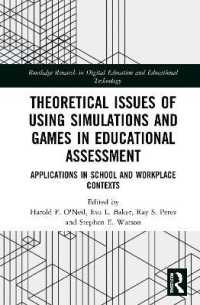Full Description
This volume examines mechanisms for regional peacemaking and conflict management in Europe and the Middle East.
To date little research has been devoted to uncovering the conditions for peace, and the factors that contribute to stabilizing the state of peace. This volume assesses the factors that contribute to regional pacification, the incentives that motivate states in establishing peaceful relations, and most importantly, how regions become peaceful. It discusses the conditions under which various types of 'peace' might emerge on a regional level and the factors most likely to determine the outcome. The book takes an innovative approach through a systematic comparison of two regions that are particularly prominent and important for the subject of regional pacification: Europe and the Middle East.
While many believe that the European case is the indispensable model for peacemaking, others believe that these two regions are too different for Europe to be a useful framework for the Middle East. This volume occupies a middle ground between these two extreme positions. It argues that while a mindless copying of European models will not lead to peace in the Middle East, important insights can be gained from the most successful case of regional peacemaking to date.
This work will be of much interest to students of regional security, peacemaking, conflict management, Middle East politics, European security and IR in general.
Contents
Introduction, Benjamin Miller Part I: Theoretical Framework 1. Explaining the Warm Peace in Europe Versus the Shifts Between Hot War and Cold Peace in the Middle East, Benjamin Miller Part II: Europe: From Hot War to Warm Peace 2. With a Little Help From our Institutions: French-German Security Relations after 1945, Andreas Hasenclever and Lukas Kasten 3. Why "Warm Peace" in Europe is not so Warm: The Impact of Immigration-Related Securitization Process on the European Security Community, Tal Dingott Alkopher 4. Voice Opportunity as a Key to Stability, Nadav Kedem 5. In search of identity: 'Normative Power Europe' through the lens of the Middle East conflict, Neve Gordon and Sharon Pardo 6. Realist Institutionalism and Regional Peace: The Case of the European Coal and Steel Community, Ilai Saltzman Part III: Middle East: From Hot War to Cold Peace - and Back to Hot (Civil) War 7. Why the Liberal Economic Model of International Peace Failed in the Middle East, Ranan Kuperman 8. Hobbes, Locke, and Kant: Systemic Cultures in the Israeli-Palestinian Conflict, Ariel Kabiri 9. The Alawi regime during the Syria civil war: from collapse to fragile stability, Yaron Friedman 10. The (de)Construction of "Economic Peace"- "Economic Peace" Strategies in the Israeli-Palestinian Conflict: Between Theory and Reality, Mor Mitrani and Galia Press-Barnathan Part IV: Comparative Perspectives 11. US "Puppets", Domestic Institutions, and Foreign Policy Compliance, Carmela Lutmar 12. The Prerequisites Matter: North America's Transition to Regional Peace, Dov H. Levin 13."Offensive Liberalism" a Critical Appraisal, Amir Lupovici 14. The Sunshine Policy: Between Cold War and Normal Peace, Alon Levkowitz Conclusions, Carmela Lutmar








